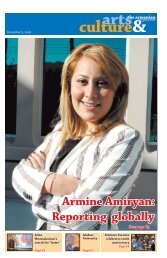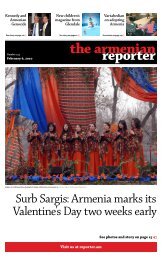National, International, Armenia, and Community News and Opinion
National, International, Armenia, and Community News and Opinion
National, International, Armenia, and Community News and Opinion
You also want an ePaper? Increase the reach of your titles
YUMPU automatically turns print PDFs into web optimized ePapers that Google loves.
The <strong>Armenia</strong>n Reporter | March 28, 2009 17<br />
<strong>Armenia</strong><br />
Not your typical <strong>Armenia</strong>n family...<br />
The Hovsepyans<br />
are a testament to<br />
the strength of a<br />
mother’s love<br />
by Nyree Abrahamian<br />
The Hovsepyan family: Back: Hayrapet (26), Hrant (21), Hayk (16), Hakob (19), Anahit (28), Murad (21), Gayane (21). Front:<br />
Susan (19), Serob (11), Gurgen (11), Larissa, Linda (10), Ashot (10). Absent: Ruzan (38), Andranik (26).<br />
YEREVAN – In Yerevan, if you’re<br />
looking for anyone under the age of<br />
15 after school hours, chances are,<br />
you’ll find them in a bak. A bak is a<br />
courtyard/parking lot area usually<br />
shared by several apartment buildings.<br />
Walk through any bak <strong>and</strong><br />
you’re sure to encounter children of<br />
all ages who live in the surrounding<br />
buildings playing tag, playing soccer,<br />
or up to some kind of mischief.<br />
The bak by St. Zoravar Church in<br />
central Yerevan is no different, except<br />
for one thing: most of the kids<br />
come from the same family.<br />
Meet the Hovespyan family.<br />
Mother, 67-year-old Larissa, 15 adopted<br />
children from all over the<br />
world, <strong>and</strong> six gr<strong>and</strong>children. The<br />
Hovespyans’ notoriety extends<br />
well beyond their bak. Often featured<br />
in the media, Larissa <strong>and</strong> her<br />
multiethnic family have become<br />
something of a household name in<br />
<strong>Armenia</strong>.<br />
It all started in 1982. After having<br />
raised the child of a relative<br />
for several years, Larissa, who<br />
was widowed, decided to adopt a<br />
child. At the time, she explains, she<br />
was a filmmaker, <strong>and</strong> would often<br />
travel to different parts of the Soviet<br />
Union to make films. From<br />
Lithuania, she adopted her first<br />
child, whom she named Hayrapet,<br />
after her father. “At the time,<br />
there were very few orphanages in<br />
<strong>Armenia</strong>, because there were very<br />
few orphans,” she explains. “There<br />
wouldn’t be more than 10–20 ab<strong>and</strong>oned<br />
children per year. Lithuania,<br />
which was also a small country with<br />
a population of only 3 million, had<br />
22 orphanages.” Hayrapet, who is<br />
of Russian origin, will be 27 in May.<br />
He is now married <strong>and</strong> has a family<br />
of his own.<br />
In 1984, she would adopt two<br />
more children from Lithuania: Andranik<br />
(26) <strong>and</strong> Anahit (28). Andranik<br />
is of Lithuanian origin <strong>and</strong> Anahit<br />
is believed to be of Karaim origin,<br />
although it is not know for certain.<br />
She was ab<strong>and</strong>oned at Vilnius<br />
airport. Then came Ruzan (38), an<br />
Azerbaijani girl born in one of the<br />
<strong>Armenia</strong>n villages that was densely<br />
populated with Azerbaijanis before<br />
the war broke out <strong>and</strong> the population<br />
exchange happened.<br />
By this time, the media was<br />
starting to take notice of Larissa<br />
<strong>and</strong> her ever-growing family. There<br />
were several articles written about<br />
her, <strong>and</strong> even a film commissioned<br />
by the central Soviet film bureau<br />
in 1988, <strong>and</strong> as a result, she became<br />
known throughout Yerevan.<br />
She became the unofficial mother<br />
to the troubled youth of the city.<br />
Many kids would come <strong>and</strong> stay<br />
with her for short periods of time.<br />
Soon after, Larissa tried to return<br />
to Lithuania to adopt the<br />
siblings of one of her adopted<br />
children, but by this time, Lithuania<br />
had already broken with the<br />
Soviet Union, <strong>and</strong> she was denied<br />
entry. Instead, she went to Minsk,<br />
the capital of Belarus, where she<br />
tried to adopt six children, but was<br />
only successful with three: Murad<br />
(Ukrainian), Hrant (Angolan), <strong>and</strong><br />
Gayane (Ethiopian-Russian). All<br />
three are now 21 years old.<br />
Things were going well for the<br />
Hovsepyan family until the early<br />
years of <strong>Armenia</strong>n independence.<br />
Of course, Larissa had her h<strong>and</strong>s<br />
full with laundry, cooking, homework,<br />
<strong>and</strong> everything in between,<br />
but she liked it that way.<br />
“Under the Soviet Union, my<br />
family was considered a ‘family-orphanage,’”<br />
says the mother of 15.<br />
That meant that the state allotted<br />
them suitable housing, a minibus,<br />
furniture, <strong>and</strong> all the necessities.<br />
Plus, they had a teacher, a doctor,<br />
a driver, <strong>and</strong> a cook. In the early<br />
1990s, almost immediately after<br />
independence, the two properties<br />
that the government had provided<br />
for them became the property of<br />
city hall <strong>and</strong> were subsequently<br />
sold, leaving the Hovsepyan family<br />
homeless. “In those early years,<br />
when there was no electricity, we<br />
had moved temporarily to our driver’s<br />
house in the village,” says Larissa,<br />
“We came back to see that our<br />
home was sold off. We were put out<br />
on the street. Just like that.”<br />
While the family stayed with different<br />
friends, Larissa was on the<br />
lookout for a new home. In 1997,<br />
she found their current groundfloor<br />
apartment <strong>and</strong> realized that<br />
it was ab<strong>and</strong>oned. So she moved<br />
her family in. Since it is legally<br />
state property, they were evicted<br />
on a few occasions, only to move<br />
back in as soon as they found an<br />
opportune chance. Since 1997, Larissa<br />
has been fighting the government<br />
<strong>and</strong> knocking on every door<br />
to obtain ownership of the property.<br />
“My father is from Mush <strong>and</strong><br />
my mother is from Rostov,” she<br />
says with pride, “Both Mushetsis<br />
<strong>and</strong> Rostov <strong>Armenia</strong>ns are known<br />
for their strength. So you can say<br />
I have a strong base.” Finally, this<br />
March, after a 12-year struggle, she<br />
got the title deed.<br />
Over the years, Larissa would<br />
continue to adopt children <strong>and</strong><br />
provide temporary care for anyone<br />
who needed it. Today though some<br />
of the older children have moved<br />
out <strong>and</strong> formed families of their<br />
own, the bak, kitchen, living room,<br />
<strong>and</strong> every nook <strong>and</strong> cranny of the<br />
Hovsepyan household are always<br />
filled with the lively voices of children.<br />
Three of her gr<strong>and</strong>children<br />
now live with her as well.<br />
Of course, like any family, there<br />
are fights. “People expect my kids to<br />
be perfect, but we’re a family, aren’t<br />
we? Of course there are fights,” says<br />
Larissa. “The older ones pick on the<br />
younger ones, the younger ones<br />
try to get the older ones in trouble.”<br />
Hrant, who is playing video games<br />
in the corner, shakes his head <strong>and</strong><br />
laughs.<br />
At 21, he has become a well-loved<br />
figure not only in his neighborhood,<br />
but all over the country. Hrant is a<br />
singer. Since he was a child, he has<br />
been bringing crowds to their feet<br />
with his renditions of <strong>Armenia</strong>n<br />
folk songs, revolutionary songs,<br />
<strong>and</strong> the kind of music that gets<br />
people dancing. He is also part of<br />
an <strong>Armenia</strong>n hip hop group called<br />
H.A.Y.Q., whose hit single, “Kami<br />
Pchi” was one of the biggest songs<br />
of summer 2007 in <strong>Armenia</strong>. He<br />
<strong>and</strong> sister Gayane, who also loves<br />
to sing but has other career ambitions,<br />
have even wowed audiences<br />
in Los Angeles.<br />
Hrant is known as the jokester<br />
of the family. He constantly has<br />
everyone in stitches. Last year, he<br />
completed his service in the <strong>Armenia</strong>n<br />
military. He was the talk<br />
of the town – an Angolan, with an<br />
<strong>Armenia</strong>n passport, serving in the<br />
<strong>Armenia</strong>n military. “Where would<br />
that <strong>Armenia</strong>n army be if it wasn’t<br />
for that Angolan with an <strong>Armenia</strong>n<br />
passport…” he joked.<br />
Gayane is pursuing a career in<br />
tourism. She is currently studying<br />
tourism <strong>and</strong> hopes to work in<br />
the field as soon as possible. She is<br />
bright, friendly, <strong>and</strong> driven, <strong>and</strong> will<br />
no doubt succeed in the industry.<br />
As we chat, a ball hits the window<br />
from the bak, immediately followed<br />
by a scream of “Mama!” then “Dadik!”<br />
Somebody’s up to something<br />
again <strong>and</strong> a weary Mama/Dadik<br />
(gr<strong>and</strong>mother) Larissa gets up to<br />
investigate.<br />
The Hovsepyan children are<br />
blessed with a happy home <strong>and</strong> the<br />
unconditional love of their mother,<br />
but financially, she does not have<br />
the means to support them. In the<br />
Republic of <strong>Armenia</strong>, there is no<br />
special provision for “family-orphanages”<br />
like there was in the Soviet<br />
Union, so the only support the<br />
government offers her is her meager<br />
pension <strong>and</strong> an unrealistically<br />
tiny allotment per month for each<br />
child. But this is not even enough<br />
for the basic necessities of food <strong>and</strong><br />
clothing.<br />
Larissa used to wash clothes <strong>and</strong><br />
do alterations for extra money, but<br />
her age no longer allows it. Most<br />
of the help the family receives is<br />
through individual donors, like<br />
Jirayr Hovespian of Los Angeles,<br />
who met the family 10 years<br />
ago, <strong>and</strong> immediately bonded with<br />
them because of their shared last<br />
name <strong>and</strong> the fact that back in Iran,<br />
between him <strong>and</strong> his cousins, he<br />
grew up in a household with 15 children<br />
too. He is currently visiting<br />
the family <strong>and</strong> hopes to prepare a<br />
segment on Larissa’s story for CNN<br />
Heroes.<br />
The family also has the backing<br />
of a few generous private enterprises,<br />
such as Ashtarak Kat, which<br />
supplies them with dairy products<br />
every week. Larissa, ever the negotiator,<br />
has also worked out a deal<br />
with the electrical company, so the<br />
company absorbs the cost of their<br />
enormously high electrical bill.<br />
The apartment, especially the<br />
bathroom, is in dire need of repair.<br />
With the help of a builder, Ashtarak<br />
Kat has taken the initial steps in<br />
compiling a breakdown of the renovations<br />
that are needed <strong>and</strong> their<br />
costs. They hope to present this list<br />
to different construction companies<br />
to see if each one can donate<br />
the supplies for at least one project.<br />
They are also setting up a website<br />
for anyone who wants to donate to<br />
the cause.<br />
Recently, Larissa was diagnosed<br />
with breast cancer. She cannot afford<br />
the pills or the treatment for<br />
her illness. As she speaks of it, her<br />
forehead creases with worry, but<br />
she quickly waves it off <strong>and</strong> adds<br />
wryly, “The good news is, the government<br />
has upped my pension by<br />
1,500 drams.”<br />
Many people have suggested<br />
that she turn her home into a<br />
certified orphanage or an NGO to<br />
receive more funding, but Larissa<br />
will hear nothing of it. “This is a<br />
family, not an orphanage. These are<br />
my children <strong>and</strong> I am their mother.<br />
Why should I deprive them of<br />
that?” Times are difficult, but Larissa<br />
is resolute. “I’ll find a way,” she<br />
says, with determination showing<br />
through her creased yet youthful<br />
eyes. “I always find a way.” f

















